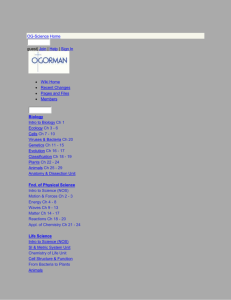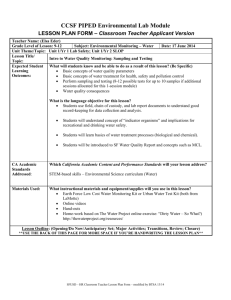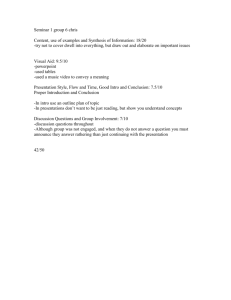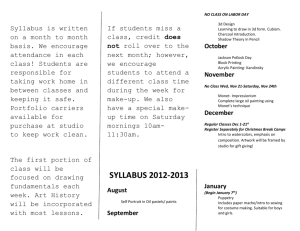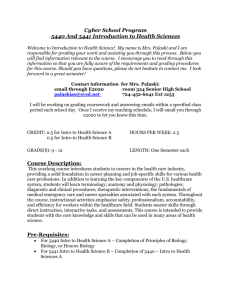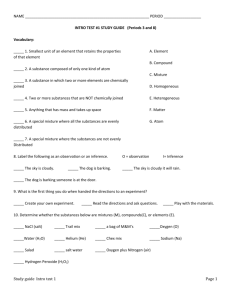Fall 2007
advertisement
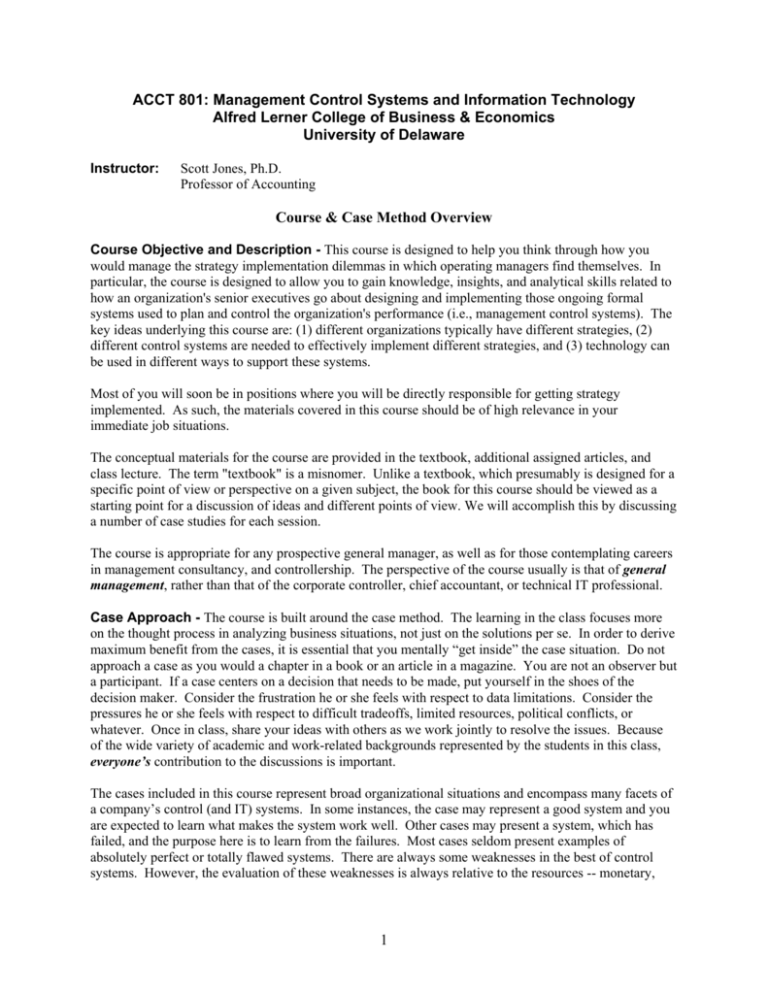
ACCT 801: Management Control Systems and Information Technology Alfred Lerner College of Business & Economics University of Delaware Instructor: Scott Jones, Ph.D. Professor of Accounting Course & Case Method Overview Course Objective and Description - This course is designed to help you think through how you would manage the strategy implementation dilemmas in which operating managers find themselves. In particular, the course is designed to allow you to gain knowledge, insights, and analytical skills related to how an organization's senior executives go about designing and implementing those ongoing formal systems used to plan and control the organization's performance (i.e., management control systems). The key ideas underlying this course are: (1) different organizations typically have different strategies, (2) different control systems are needed to effectively implement different strategies, and (3) technology can be used in different ways to support these systems. Most of you will soon be in positions where you will be directly responsible for getting strategy implemented. As such, the materials covered in this course should be of high relevance in your immediate job situations. The conceptual materials for the course are provided in the textbook, additional assigned articles, and class lecture. The term "textbook" is a misnomer. Unlike a textbook, which presumably is designed for a specific point of view or perspective on a given subject, the book for this course should be viewed as a starting point for a discussion of ideas and different points of view. We will accomplish this by discussing a number of case studies for each session. The course is appropriate for any prospective general manager, as well as for those contemplating careers in management consultancy, and controllership. The perspective of the course usually is that of general management, rather than that of the corporate controller, chief accountant, or technical IT professional. Case Approach - The course is built around the case method. The learning in the class focuses more on the thought process in analyzing business situations, not just on the solutions per se. In order to derive maximum benefit from the cases, it is essential that you mentally “get inside” the case situation. Do not approach a case as you would a chapter in a book or an article in a magazine. You are not an observer but a participant. If a case centers on a decision that needs to be made, put yourself in the shoes of the decision maker. Consider the frustration he or she feels with respect to data limitations. Consider the pressures he or she feels with respect to difficult tradeoffs, limited resources, political conflicts, or whatever. Once in class, share your ideas with others as we work jointly to resolve the issues. Because of the wide variety of academic and work-related backgrounds represented by the students in this class, everyone’s contribution to the discussions is important. The cases included in this course represent broad organizational situations and encompass many facets of a company’s control (and IT) systems. In some instances, the case may represent a good system and you are expected to learn what makes the system work well. Other cases may present a system, which has failed, and the purpose here is to learn from the failures. Most cases seldom present examples of absolutely perfect or totally flawed systems. There are always some weaknesses in the best of control systems. However, the evaluation of these weaknesses is always relative to the resources -- monetary, 1 manpower, etc. -- available to a company. Thus, it may be costly to remove flaws. Any recommendation for changes when analyzing cases should carefully consider the organization costs involved Case Process - Careful preparation of each case, whether for written submission or just for discussion in class is essential. You need to read every case at least twice before the scheduled class discussion in order to become familiar with the situation. If you do not do this, you will not be able to follow and understand the class discussion, be bored out of your mind, and therefore you will not learn anything. I am not responsible for your lack of preparation. Normally, here is how case discussions will progress: Before class: First reading: The problem to be solved is framed by the situation facing the company and its decision makers. Try to remember the facts of the case, the company's situation, the characters and their points of view. At some point you need to put the problem in the context of the situation. The more familiar you are with the facts and environment of the case, the easier it will be to understand the case. Second reading: Try understanding how computations (if any are presented) are made. Look at exhibits and tables carefully. It is expected that you may not understand some reports. Please ask a question in class if you need clarification or explanations about technical details. Most importantly, put yourself in the character's position and try to understand what motivates them and those around them to act in the strategic interest of the company. Management control is about people and getting people to take optimal actions, so we must understand peoples' motivations. If you can think of a situation in your own experience that relates to the case, remember to mention this during class discussion. Learning from others' experiences is a significant part of this course. During Class: If a writing assignment is due, the case will be introduced in the meeting prior to the due date of that case. For example, if a writing assignment is due at the fourth class meeting, the case will be introduced during the third class meeting. This means you need to begin your reading prior to the third class meeting. During this time of introduction to a case, we will begin to focus on the major issues. You should ask questions about computations, etc. that you might not understand. You should go home, read the case several additional times and dig deeply into the issues presented. Situation variables should be evident from class discussion, and you should be able to focus on solutions or recommendations that make sense given the resources available. At the time of this introduction, I will identify areas that should be addressed in the written case analysis. On the due date of a writing assignment or a discussion-only case, we will discuss the case as thoroughly as time permits. This generally involves reviewing the relevant facts of the case, some possible solutions, and a discussion of the merits of those solutions. Typically, there is NO SINGLE BEST SOLUTION, only choices that are rational depending upon the decision makers' circumstances, perspective, risk aversion, and value system. Evaluation of Contributions to Class Discussion Nearly all interactions in an organization are oral. Course participants are from diverse backgrounds and we all learn from shared experiences. For these reasons, the development of your oral communication skills (speaking and listening) is important in executive education. Effective participation is characterized by: *Relevant points rather than repetition of facts *Interpretation and integration of points made previously *Willingness to test new ideas *Challenges/tests ideas presented by others *Reflects thorough understanding of case facts 2 You must participate for the case analysis method to be effective. You do not need to contribute on every case, however. I am looking for involved participation which is different from attentive note-taking and passive listening. Your contribution is gauged and points (and consequently final grades) will be assigned based on the following categories: Outstanding: Comments reflect thorough preparation. Ideas are substantive. Arguments are persuasive. Comments provide major insight and direction for the class. Requires active participation. (20) Good: The student is thoroughly prepared and ideas mostly substantive. Participant provides good insight and sometimes direction for the class. Arguments are substantive and persuasive. Requires at least frequent participation. (16-19) Adequate: Contributions reflect adequate preparation. Comments are sometimes substantive and provide useful insights but do not offer new directions for the class. Sometimes arguments are presented, and are fairly well articulated. Requires at least semi-frequent participation (15) Non-participant: The person has said little or nothing in class. There is no basis for evaluation. This person has no effect on the quality of class discussion. (0-15 depending on attendance) 3 Schedule – FALL 2007 DATE Aug 29 Topic Introduction Sep 5 Nature of MCS & Understanding Strategy Sep 12 Cost determination & Internal Control Sep19 Behavior in Organizations Sep 26 Oct 3 Oct 10 Oct 17 Responsibility Centers Controlling Assets Strategic Planning Budget Preparation Reading for Class Handout AC Power Logic, Inc. Chapter 1 Case 1-1 Nucor Case 2-1, 2-2, 2-3 Enclycplopædia Brittanica (A,B,C) Intro to internal Control Intro to cost accounting Standard Costs & variances Case 4-4 Whiz Calculator Assignment Due Survey Mystic Marvel(Handout) Chapter 3 Case 3-2 Nucor (B) Case 4-6 Grand Jean Co. Mystic Marvel Chapter 4 Chapter 5 Case 4-6 Grand Jean Co. Case 5-4 Abrams Co. Case 6-2 Birch Paper Chapter 6 Chapter 7 Case 5-4 Abrams Case 6-2 Birch Case 7-4 Aloha Classic Pen Co. Chapter 8 & 9 Classic Pen Company Case 8-1 Allied Office Prod Case 7-4 Aloha Citbank Perf. Eval Introduction Chapter 9 Chapter 10 Case 9-2 Corning Case 8-1 Allied Citibank Performance Eval Case 10-3 Galvor 4 Discuss Discuss HBS Online HBS Online HBS Online Discuss only Discuss only Intro Due * Due** Intro Intro Due** Due* Intro Intro (HBS Online) Due* Intro Due** Intro Discuss only Due* Due* Discuss only Oct 24 Oct 31 Nov 7 Performance Reporting International Issues Compensation Nov 14 Entrepreneurial Control Nov 21 Nov 28 Thanksgiving Break IT & Control Dec 5 Wrap-up Dec 12 Final Exam Summary of Assignments Due Type Number required Homework * 3 of 5 (15) Case Analysis ** 4 of 9 (40) Final Exam 1 of 1 (15) 1 of 1 (10) Chapter 11 Case 11-1, 11-2 Analog Devices (A & B) Case 12-2 & 15-1 Lincoln Elec. Research Lincoln Case Chapter 12 Case 11-1, 11-2 Analog Case 12-2 Lincoln Electric Serono Serono Intro to new ventures 5-3 Analog Devices Musimundo ATH No class Musimundo ATH Whirlpool General Dynamics Final Exam Case Announced Whirlpool General Dynamics Final Exam Case Introduction Intro Intro Due** Due**(Required) Intro (HBS Online) Due** Handout Discuss Intro (HBS Online) Intro (HBS Online) Eat Turkey Due** Due** Intro (HBS Online) Intro (HBS Online) Due** Due** Final Case Due 6pm (required) Eligible Cases Mystic Marvel, Birch Paper, Classic Pen, Allied Office, Citbank Grand Jean, Abrams, Aloha, Analog Devices, Serono, Musimundo, ATH, Whirlpool, General Dynamics Lincoln Electric To be announced 5
